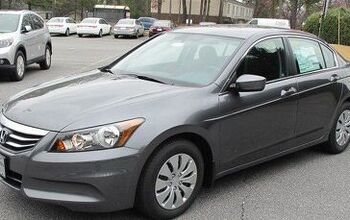Hammer Time: Protectionism Uber Alles?
I love stability. Give me a world where folks can put forth a solid effort in their work and not worry about their future, and I’ll gladly join it with membership in hand. But then with too much stability also comes mediocrity. In times of yore, a lot of folks could simply get by with offering products and services that were less than world class. To put it kindly, they sold crap. But they also benefited from a playing field where the strongest and fiercest were kept far from the action and their kids inevitably got the education needed to make the laggard company successful. Auto Companies in South Korea, Japan and now China have benefited from protectionist policies that offered different degrees of medium-term stability and long-term learning for their once weak automakers. Should we follow suit?
I don’t know. I do believe that the current system we have now stacks the cards against the domestic automakers and encourages them to produce their products overseas. For those of you who believe that this is the only function that’s exported, dream on. China is literally building an exceptionally large market by educating their population and stealing technology whenever possible. The South Koreans throw in a very long line of trade barriers and restrictions that have made foreign competition very minimal in their market. Who did they learn that from?
Primarily from the Japanese. And nearly every country and economic union have policies that intentionally regulate foreign competition. Throw in the fact that a lot of Volkswagen’s (and Daimler’s) success is determined by being the in-house favorite in several developing countries, and you end up with a ‘myth’ of truly open markets. Given our untenable deficits and high unemployment, I repeat: is it time for us to follow suit?
More by Steven Lang
Latest Car Reviews
Read moreLatest Product Reviews
Read moreRecent Comments
- Analoggrotto I don't see a red car here, how blazing stupid are you people?
- Redapple2 Love the wheels
- Redapple2 Good luck to them. They used to make great cars. 510. 240Z, Sentra SE-R. Maxima. Frontier.
- Joe65688619 Under Ghosn they went through the same short-term bottom-line thinking that GM did in the 80s/90s, and they have not recovered say, to their heyday in the 50s and 60s in terms of market share and innovation. Poor design decisions (a CVT in their front-wheel drive "4-Door Sports Car", model overlap in a poorly performing segment (they never needed the Altima AND the Maxima...what they needed was one vehicle with different drivetrain, including hybrid, to compete with the Accord/Camry, and decontenting their vehicles: My 2012 QX56 (I know, not a Nissan, but the same holds for the Armada) had power rear windows in the cargo area that could vent, a glass hatch on the back door that could be opened separate from the whole liftgate (in such a tall vehicle, kinda essential if you have it in a garage and want to load the trunk without having to open the garage door to make room for the lift gate), a nice driver's side folding armrest, and a few other quality-of-life details absent from my 2018 QX80. In a competitive market this attention to detai is can be the differentiator that sell cars. Now they are caught in the middle of the market, competing more with Hyundai and Kia and selling discounted vehicles near the same price points, but losing money on them. They invested also invested a lot in niche platforms. The Leaf was one of the first full EVs, but never really evolved. They misjudged the market - luxury EVs are selling, small budget models not so much. Variable compression engines offering little in terms of real-world power or tech, let a lot of complexity that is leading to higher failure rates. Aside from the Z and GT-R (low volume models), not much forced induction (whether your a fan or not, look at what Honda did with the CR-V and Acura RDX - same chassis, slap a turbo on it, make it nicer inside, and now you can sell it as a semi-premium brand with higher markup). That said, I do believe they retain the technical and engineering capability to do far better. About time management realized they need to make smarter investments and understand their markets better.
- Kwik_Shift_Pro4X Off-road fluff on vehicles that should not be off road needs to die.


































Comments
Join the conversation
Won't the continual and ongoing devaluation of the dollar eventually solve this ? Importing a car will become more expensive, and overseas labor will become more expensive compared with domestic labor and production.